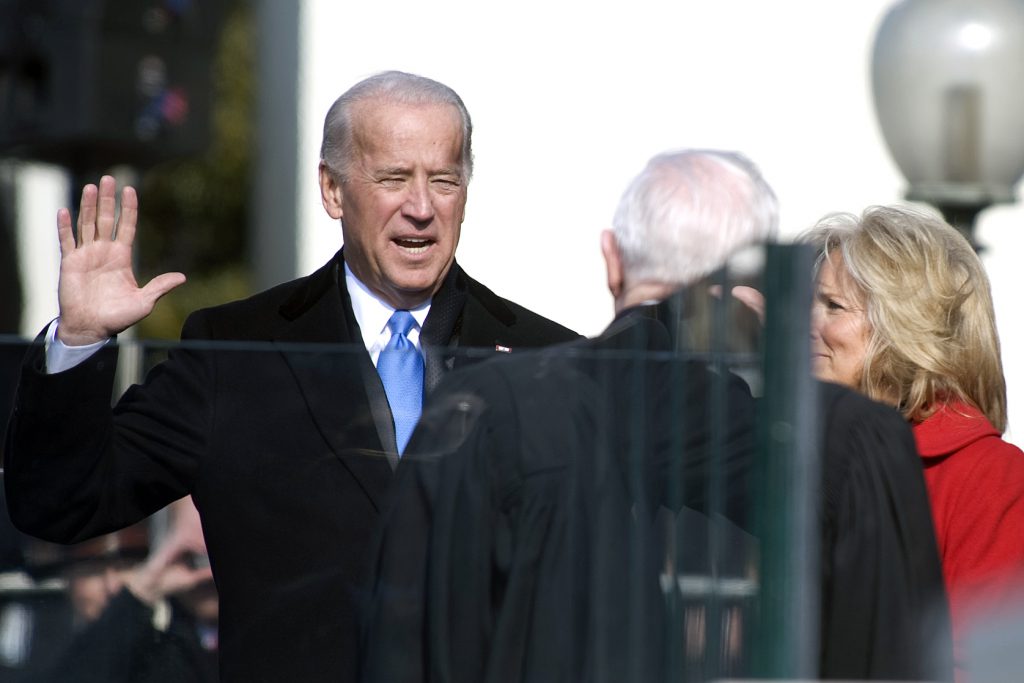
Published April 25, 2019
The front-runner has finally thrown his hat into the ring. Joe Biden starts the 2020 campaign not only as the favorite for the Democratic nomination but also probably as a slight favorite to win the presidency itself.
Biden’s virtue in both contests is his relative moderation. He stands to the right of the bulk of his putative Democratic competitors, someone who has not built a career as a paladin of progressive policy priorities, as Sen. Bernie Sanders (Vt.) or Sen. Elizabeth Warren (Mass.) have done. But he stands to the left of President Trump on a host of issues. If the median American voter is like Goldilocks — in search of something not too left, not too right, but just right — Biden is well positioned to be her choice.
That moderation is a virtue even in the Democratic primary. Self-described moderates and conservatives remain about half of the Democratic primary electorate, and as the other candidates play the popular parlor game “More Progressive Than Thou,” Biden sits largely alone hoovering up support from the largest ideological bloc. Early polls show how tilted Biden’s support is toward moderates, and his continued leads show how strong such a tilt can be.
His potential to unseat Trump, however, is even more striking. He leads the president by an average of 7.8 percent in the RealClearPolitics average of national general election trial heats so far, easily the largest of any potential Democratic nominee. That lead is not just a function of high name ID, either. Sanders is about as well known as is Biden, yet he leads Trump by only 2.7 points. There are clearly some swing voters who feel comfortable with Biden in a matchup with Trump while feeling uneasy with the other contenders at this stage.
That ability to speak to that swing voter is going to be the key factor in the general election. Only 38 percent of voters had a favorable opinion of Trump on Election Day 2016, according to the exit poll, five points lower than Hillary Clinton’s favorable rating. Trump won because he decisively defeated Clinton by a 47-to-30 margin among the 18 percent of voters who did not like either candidate. In effect, “Never Hillary” beat “Never Trump” to the shock of pundits everywhere.
Trump’s reelection still relies on creating that negative comparison more than two years into his presidency. His job approval rating rests at a shade higher than 43 percent in the RCP average, and he has not been able to surpass 44 percent approval for more than a week since March 2017. In the past two presidential reelection races, the incumbents received only a 0.9 percent (Bush) and 1.0 percent (Obama) share of the popular vote above their final job approval ranking. Even the electoral map’s Midwestern tilt, which enabled Trump to win a narrow electoral college majority with only 45.9 percent of the popular vote, can’t save Trump if he only polls 44 percent of the vote.
This means Trump’s only hope, assuming he can’t raise his job approval rating, is to turn the Democratic nominee into a pariah. He needs to make “Never [Insert Nominee Name]” as powerful as “Never Hillary” to force some of the people who disapprove of him to reluctantly back him a second time. He might be able to do that with most potential Democrats. But it seems a hard task with Biden.
Biden’s supposed weaknesses are actually massive strengths. Assuming he can withstand the physical rigors of campaigning, his age and experience contrast well with Trump. You might not like Biden’s views, but you know he’s not going to govern by tweet or embarrass the nation with fawning statements to mass-murdering dictators. Republicans will see Biden as a liberal, but voters who don’t like Trump will likely see Biden’s relatively moderate liberalism as just right, especially in comparison to a man whom many loathe. If “Tricky Dick” Nixon could resurrect his career in the tumultuous year of 1968 by running as the stable, experienced hand to steer the ship, “Uncle Joe” Biden can do likewise.
That’s not to say he’s got it wrapped up. Campaigning unveils a person’s character, for better and for worse. Biden has a history of gaffes and rarely likes direct confrontation. He’s going to have to endure such direct attacks and resist the twin temptations of bending over too much to please the attackers or fighting too strenuously to combat them. That whipsaw weakness is ultimately what sank Massachusetts Gov. Michael Dukakis, who blew a 17 point lead in late July 1988 over George H.W. Bush to lose 40 states in November. Biden has failed to impress in two prior bids for the White House for a reason; starting with a big lead won’t save him if he hasn’t learned his lessons.
Biden, nonetheless, starts in the driver’s seat. Democrats, independents and Republican defectors searching for a return to normalcy after years of turmoil will likely see him as their best hope. If he understands this, a year from now he’ll be the presumptive nominee and a substantial favorite to win.
Henry Olsen is a Washington Post columnist and a senior fellow at the Ethics and Public Policy Center.




